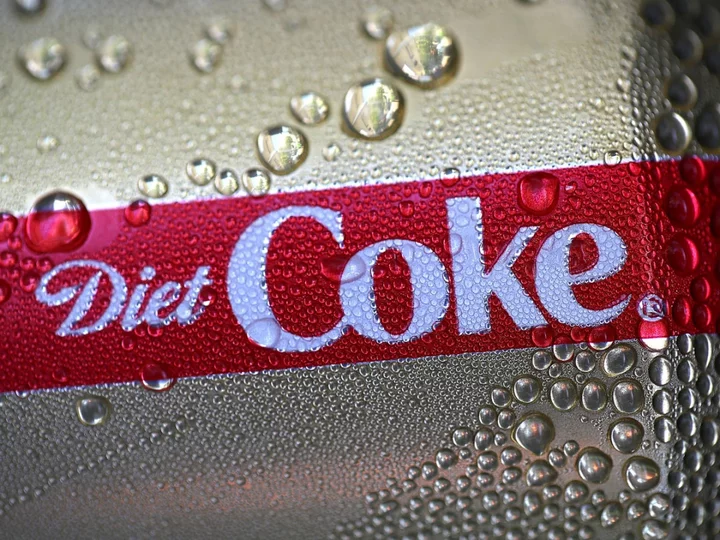Fans of Diet Coke have reacted with despair at reports that the World Health Organisation (WHO) may catagorise aspartame – an artificial sweetener in the drink – a potential carcinogen. It was reported on Thursday (29 June) that the health organisation’s cancer research unit, the International Agency for Research on Cancer (IARC), is preparing to label aspartame as potentially cancerous from July. Aspartame is a low-calorie artificial sweetener that is approximately 200 times sweeter than sugar and is used in a huge number of soft drinks, including Diet Coke, Pepsi Max, Diet Irn Bru, and Sprite Zero, among others. It is also used in foods such as chewing gum, candy, breakfast cereal, frozen desserts and puddings, and gelatins. Although the IARC’s ruling on the sweetener remains confidential until July, Diet Coke fans are already wondering if they might have to give up their favourite fizzy drink. “If they interfere with Diet Coke it will be the final straw for me I’m afraid,” one person warned. Another joked they have already “drunk the Diet Coke equivalent of swimming at a superfund site” in their lifetime. “You can take away my Diet Coke when you pry it out of my cold dead hands,” a third mordantly added. “Listen, if you’re going to take away Diet Coke from us, you better be prepared for 72 per cent of women aged 25-45 to quit their jobs,” another person claimed. “That’s all I’m saying. *Cracks open third Diet Coke before noon*” Others appeared smug that they had never switched from regular full-fat Coke – which contains around 10.6g of sugar per 100ml, equating to 35g per 330ml can – to the low-sugar version. One person referred to a scene from hit series Friends that showed Chandler (Matthew Perry) shouting: “I knew it!” Another said: “I told you all that Diet Coke was just as bad as regular Coke.” The IARC is expected to make its decision over aspartame public on 14 July, the same day as the Joint WHO and Food and Agriculture Organisation’s Expert Committee on Food Additives (JECFA), which is also reviewing aspartame use this year. JECFA has said it is safe to consume aspartame within accepted daily limits since 1981. An adult weighing 60kg (132 pounds) would have to drink between 12 and 36 cans of diet soda every day to be at risk, a view widely shared by national regulators. The additives committee “conducts risk assessment, which determines the probability of a specific type of harm (eg., cancer) to occur under certain conditions and levels of exposure”. The review of aspartame comes after a study conducted by experts from the French National Institute for Health and Medical Research, and Sorbonne Paris Nord University, published on March 2022, claimed it could increase the risk of cancer in people who consume it. But previous large-scale studies on humans have not revealed similar associations. A separate study published last December found that aspartame was linked to anxiety in mice. The deputy chief scientific adviser of the UK’s Food Standards Agency, Rick Mumford, commented on reports and said: “Our view is that the safety of this sweetener has been evaluated by various Scientific Committees and it is considered safe at current permitted use levels. “The IARC report has not yet been published and, when it is, it will be examined by the JECFA, who will put together a risk assessment by the end of July. We will closely study JECFA’s report and decide whether any further actions are needed.” The Independent has contacted Coca-Cola for comment. Read More Walk this way... but not like that: How men’s walks became sexualised Colleen Ballinger: Everything we know about the ‘grooming’ allegations against YouTuber Miranda Sings Kevin Costner’s estranged wife says she’ll move out of their $145m home on one condition ‘My small rash turned out to be a parasite living in my leg after a beach trip’ Chrissy Teigen welcomes fourth child – how does surrogacy actually work? Heart disease digital check-ups for over 40s being rolled out
Fans of Diet Coke have reacted with despair at reports that the World Health Organisation (WHO) may catagorise aspartame – an artificial sweetener in the drink – a potential carcinogen.
It was reported on Thursday (29 June) that the health organisation’s cancer research unit, the International Agency for Research on Cancer (IARC), is preparing to label aspartame as potentially cancerous from July.
Aspartame is a low-calorie artificial sweetener that is approximately 200 times sweeter than sugar and is used in a huge number of soft drinks, including Diet Coke, Pepsi Max, Diet Irn Bru, and Sprite Zero, among others.
It is also used in foods such as chewing gum, candy, breakfast cereal, frozen desserts and puddings, and gelatins.
Although the IARC’s ruling on the sweetener remains confidential until July, Diet Coke fans are already wondering if they might have to give up their favourite fizzy drink.
“If they interfere with Diet Coke it will be the final straw for me I’m afraid,” one person warned.
Another joked they have already “drunk the Diet Coke equivalent of swimming at a superfund site” in their lifetime.
“You can take away my Diet Coke when you pry it out of my cold dead hands,” a third mordantly added.
“Listen, if you’re going to take away Diet Coke from us, you better be prepared for 72 per cent of women aged 25-45 to quit their jobs,” another person claimed. “That’s all I’m saying. *Cracks open third Diet Coke before noon*”
Others appeared smug that they had never switched from regular full-fat Coke – which contains around 10.6g of sugar per 100ml, equating to 35g per 330ml can – to the low-sugar version.
One person referred to a scene from hit series Friends that showed Chandler (Matthew Perry) shouting: “I knew it!”
Another said: “I told you all that Diet Coke was just as bad as regular Coke.”
The IARC is expected to make its decision over aspartame public on 14 July, the same day as the Joint WHO and Food and Agriculture Organisation’s Expert Committee on Food Additives (JECFA), which is also reviewing aspartame use this year.
JECFA has said it is safe to consume aspartame within accepted daily limits since 1981. An adult weighing 60kg (132 pounds) would have to drink between 12 and 36 cans of diet soda every day to be at risk, a view widely shared by national regulators.
The additives committee “conducts risk assessment, which determines the probability of a specific type of harm (eg., cancer) to occur under certain conditions and levels of exposure”.
The review of aspartame comes after a study conducted by experts from the French National Institute for Health and Medical Research, and Sorbonne Paris Nord University, published on March 2022, claimed it could increase the risk of cancer in people who consume it.
But previous large-scale studies on humans have not revealed similar associations. A separate study published last December found that aspartame was linked to anxiety in mice.
The deputy chief scientific adviser of the UK’s Food Standards Agency, Rick Mumford, commented on reports and said: “Our view is that the safety of this sweetener has been evaluated by various Scientific Committees and it is considered safe at current permitted use levels.
“The IARC report has not yet been published and, when it is, it will be examined by the JECFA, who will put together a risk assessment by the end of July. We will closely study JECFA’s report and decide whether any further actions are needed.”
The Independent has contacted Coca-Cola for comment.
Read More
Walk this way... but not like that: How men’s walks became sexualised
Colleen Ballinger: Everything we know about the ‘grooming’ allegations against YouTuber Miranda Sings
Kevin Costner’s estranged wife says she’ll move out of their $145m home on one condition
‘My small rash turned out to be a parasite living in my leg after a beach trip’
Chrissy Teigen welcomes fourth child – how does surrogacy actually work?
Heart disease digital check-ups for over 40s being rolled out









